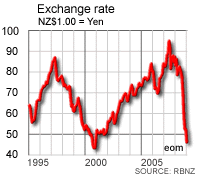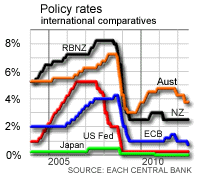 By BNZ Currency Strategist Danica Hampton The NZD/USD has slipped lower over the past 24 hours, falling from above 0.7000 yesterday morning to nearly 0.6940 last night. A plunge in GBP/USD, following comments from UK Chancellor of the Exchequer Darling about the challenging UK environment, triggered a rebound in the USD and set the scene for NZD/USD to move lower. But it was really heavy selling of JPY crosses, which is being attributed to Japanese margin accounts liquidating long positions, that knocked the wind out of the local currency. NZD/JPY slipped from above 76.00 to almost 75.00. Overnight, the USD was further bolstered by a large slide in crude oil prices. Crude oil futures prices fell more than 5% to below US$111/barrel as a weakening of Hurricane Gustav reduced the risk of major disruption to oil supplies. The backdrop of NZD/JPY selling and a firmer USD saw NZD/USD sink to within a whisker of 0.6940.
By BNZ Currency Strategist Danica Hampton The NZD/USD has slipped lower over the past 24 hours, falling from above 0.7000 yesterday morning to nearly 0.6940 last night. A plunge in GBP/USD, following comments from UK Chancellor of the Exchequer Darling about the challenging UK environment, triggered a rebound in the USD and set the scene for NZD/USD to move lower. But it was really heavy selling of JPY crosses, which is being attributed to Japanese margin accounts liquidating long positions, that knocked the wind out of the local currency. NZD/JPY slipped from above 76.00 to almost 75.00. Overnight, the USD was further bolstered by a large slide in crude oil prices. Crude oil futures prices fell more than 5% to below US$111/barrel as a weakening of Hurricane Gustav reduced the risk of major disruption to oil supplies. The backdrop of NZD/JPY selling and a firmer USD saw NZD/USD sink to within a whisker of 0.6940.  The RBA decision (due at 4:30pm NZ time) will be a key focus. While the RBA is widely expected to cut rates 25bps to 7.00% today, with recent Australia data suggesting the economy is not slowing as sharply as many feared market participants may be overestimating the scope of future RBA rate cuts. Current market pricing is consistent with 75bps of cuts in total by year-end. Should today’s RBA statement temper the market’s easing expectations, this will likely help support AUD/USD. While a rebound in AUD/USD will likely provide a bit of a prop for NZD/USD, we would also expect to see renewed downward pressure on NZD/AUD. For today, the global backdrop of a firmer USD, and weaker JPY crosses, should keep the downward pressure on NZD/USD. However, the RBA decision is a key risk later in the day. We suspect bounces towards the 0.6990-0.7000 region will attract sellers. A break below initial support in the 0.6940 region would open up the downside towards 0.6900. Majors The USD strengthened against most of the major currencies last night, underpinned by heavy selling of JPY crosses and a slide in crude oil prices. Early in the offshore session, heavy selling of JPY crosses, thought to be related to Eurozone coupon repatriation and Japanese margin traders liquidating long positions, dominated. Comments from Sakakibara, who said a “stronger yen is clearly in Japan’s interestâ€, helped support JPY and USD/JPY sank from above 108.60 to below 107.60. Market participants shrugged off news that Japan’s Prime Minister Fukuda had resigned. Later in the session, a significant pull-back in crude oil prices helped bolster the USD. Crude oil futures prices fell from around US$117 to below US$111/barrel after Hurricane Gustav was revised to a category 2 storm, which reduces the risk of major disruption to oil supplies. Against a backdrop of EUR/JPY selling and a firmer USD, EUR/USD fell from above 1.4700 to nearly 1.4580.
The RBA decision (due at 4:30pm NZ time) will be a key focus. While the RBA is widely expected to cut rates 25bps to 7.00% today, with recent Australia data suggesting the economy is not slowing as sharply as many feared market participants may be overestimating the scope of future RBA rate cuts. Current market pricing is consistent with 75bps of cuts in total by year-end. Should today’s RBA statement temper the market’s easing expectations, this will likely help support AUD/USD. While a rebound in AUD/USD will likely provide a bit of a prop for NZD/USD, we would also expect to see renewed downward pressure on NZD/AUD. For today, the global backdrop of a firmer USD, and weaker JPY crosses, should keep the downward pressure on NZD/USD. However, the RBA decision is a key risk later in the day. We suspect bounces towards the 0.6990-0.7000 region will attract sellers. A break below initial support in the 0.6940 region would open up the downside towards 0.6900. Majors The USD strengthened against most of the major currencies last night, underpinned by heavy selling of JPY crosses and a slide in crude oil prices. Early in the offshore session, heavy selling of JPY crosses, thought to be related to Eurozone coupon repatriation and Japanese margin traders liquidating long positions, dominated. Comments from Sakakibara, who said a “stronger yen is clearly in Japan’s interestâ€, helped support JPY and USD/JPY sank from above 108.60 to below 107.60. Market participants shrugged off news that Japan’s Prime Minister Fukuda had resigned. Later in the session, a significant pull-back in crude oil prices helped bolster the USD. Crude oil futures prices fell from around US$117 to below US$111/barrel after Hurricane Gustav was revised to a category 2 storm, which reduces the risk of major disruption to oil supplies. Against a backdrop of EUR/JPY selling and a firmer USD, EUR/USD fell from above 1.4700 to nearly 1.4580.  Comments from Eurogroup Chairman Juncker, who noted “the euro is still overvalued", did little to aid EUR sentiment. The EZ manufacturing PMI contracted again in August (printed at 47.6 vs. 47.5 forecast). The PMI has been in contractionary territory for three consecutive months, which raises the risk of a negative Q3 GDP. GBP/USD fell below 1.8000 last night – the first time since April 2006. GBP was pressured by the broadly firmer USD and by comments made over the weekend by UK Chancellor of the Exchequer Alistair Darling, who said the UK economic outlook was its most challenging in 60 years. Data showing the UK manufacturing sector continuing to contract in August and mortgage approvals dropping to an all-time low in July, did little to dispel fears that the UK is on the brink of recession. While the US economy is far from a picture of health, we can’t help but think the USD will come off looking the best of a bad bunch. After all, recent US data has tended to surprise on the upside, unlike data elsewhere in the world. The ECB is widely expected to keep rates steady at 4.25% on Thursday, but with the Eurozone economy already halfway to a formal recession the ECB’s optimism looks increasingly misplaced. Similarly, the Bank of England is likely to hold rates steady at 5.00% this week, but the MPC’s inflation concerns will likely be overshadowed by the risk of a UK recession in coming months. In the absence of a serious stock market plunge, a spike in crude oil prices or a disastrous US non-farm payrolls number (due September 5) we expect the USD to remain firm.
Comments from Eurogroup Chairman Juncker, who noted “the euro is still overvalued", did little to aid EUR sentiment. The EZ manufacturing PMI contracted again in August (printed at 47.6 vs. 47.5 forecast). The PMI has been in contractionary territory for three consecutive months, which raises the risk of a negative Q3 GDP. GBP/USD fell below 1.8000 last night – the first time since April 2006. GBP was pressured by the broadly firmer USD and by comments made over the weekend by UK Chancellor of the Exchequer Alistair Darling, who said the UK economic outlook was its most challenging in 60 years. Data showing the UK manufacturing sector continuing to contract in August and mortgage approvals dropping to an all-time low in July, did little to dispel fears that the UK is on the brink of recession. While the US economy is far from a picture of health, we can’t help but think the USD will come off looking the best of a bad bunch. After all, recent US data has tended to surprise on the upside, unlike data elsewhere in the world. The ECB is widely expected to keep rates steady at 4.25% on Thursday, but with the Eurozone economy already halfway to a formal recession the ECB’s optimism looks increasingly misplaced. Similarly, the Bank of England is likely to hold rates steady at 5.00% this week, but the MPC’s inflation concerns will likely be overshadowed by the risk of a UK recession in coming months. In the absence of a serious stock market plunge, a spike in crude oil prices or a disastrous US non-farm payrolls number (due September 5) we expect the USD to remain firm.
Opinion: RBA seen cutting Aussie rates 75 bps by end of 08
Opinion: RBA seen cutting Aussie rates 75 bps by end of 08
2nd Sep 08, 9:02am
by
We welcome your comments below. If you are not already registered, please register to comment
Remember we welcome robust, respectful and insightful debate. We don't welcome abusive or defamatory comments and will de-register those repeatedly making such comments. Our current comment policy is here.